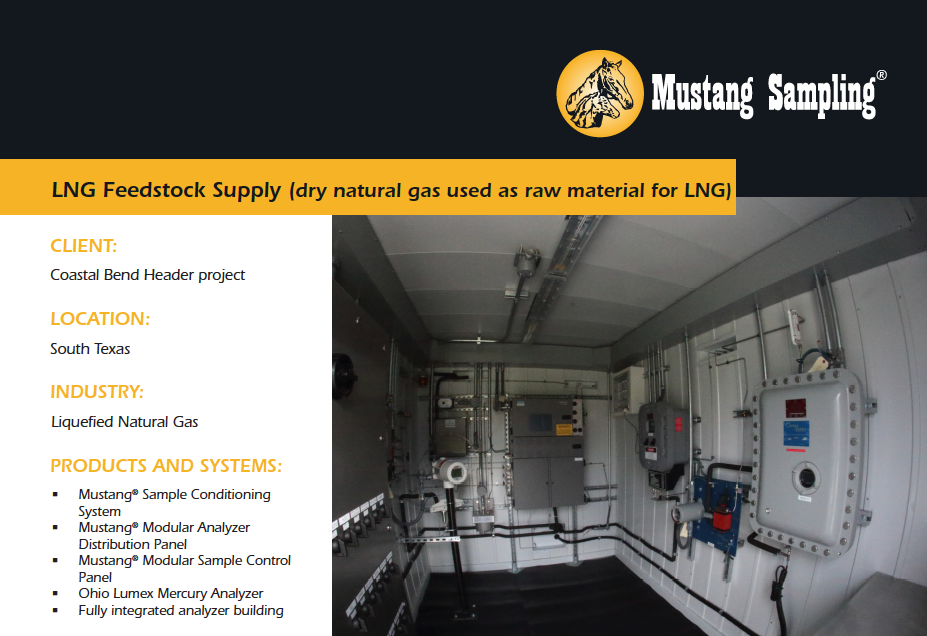CLIENT:
Coastal Bend Header project
LOCATION:
South Texas
INDUSTRY:
Liquefied Natural Gas
PRODUCTS AND SYSTEMS:
- Mustang® Sample Conditioning System
- Mustang® Modular Analyzer Distribution Panel
- Mustang® Modular Sample Control Panel
- Ohio Lumex Mercury Analyzer
- Fully integrated analyzer building
THE BACKGROUND
Gulf South Pipeline applied to FERC to build the Coastal Bend Header Pipeline in 2015, a 66-mile-long, 36-inch-diameter pipeline lateral with a proposed capacity of 1.42 billion cubic feet per day, in Wharton and Brazoria Counties in Texas. They received FERC approval one year later and began construction of the pipeline in April, 2017. The project includes seven new interconnects with various interstate and intrastate pipelines delivering natural gas to the Freeport LNG Development, L.P., a liquefaction terminal in Freeport, Texas. Freeport LNG’s full capacity has been contracted by BP Energy Company, Chubu US Gas Trading, Osaka Gas Trading & Export and E.ON Global Commodities North America, on 20-year firm transportation agreements.
The Gulf South FERC NGA Gas Tariff specifications for the Coastal Bend Header stated the receipt stations must have on-line monitoring equipment installed at each interconnect detecting oxygen, moisture, hydrogen sulfide (H2S), BTEX components (benzene, toluene, ethyl-benzene, and xylenes), and mercury (Hg). The equipment needs to detect deviations from established Gas Quality Standards in real time, to allow the interception of such gas from the Coastal Bend Header.
The variability of concentrations of both hydrocarbons and inorganic components in extracted gases can change significantly during the operation of natural gas reservoirs. Factors such as regional tectonic setting, structural geologic features, seismic activity, storage of hydrocarbons, and operational conditions are just a few contributing factors at any given moment. Particularly in areas of the western United States dissected by the intersection of deep fault zones, high mercury concentrations can appear in these reservoirs.
Because natural gas fields can potentially produce large variations in levels of mercury, hydrogen sulfide, aromatics, oxygen and moisture content over time, the natural gas composition blend at the Stratton Ridge delivery point to Freeport LNG may not meet the precedent agreement. If the gas composition does not meet the precedent agreement this can threaten the gas quality and lead to potential volume reductions or shut-in of certain receipt point(s).
THEIR CHALLENGE
At the time the Gulf South FERC NGA Gas Tariff specifications were put into place, there was not a viable online analyzer for mercury detection in place within the natural gas industry. Already entrenched into the market as analytical building supplier, Mustang Sampling reached out to an industry leader in mercury detection, Ohio Lumex, to build an online detection device suitable for the use in natural gas.
The Mercury analyzer that Ohio Lumex developed was already functional outside the Natural Gas Industry. The main tasks were to ensure the system could be installed at a receipt meter station, provide the pipeline manager with the power to monitor the efficacy and efficiency of the mercury analyzing process, package the analyzer correctly, gain approval, and provide a proper interface into the pipeline system.
As a contaminant of natural gas, the accumulation of mercury in pipelines can pose a threat not only to the pipelines but also in the downstream heat exchangers used in the liquefaction process of LNG. By installing online mercury analyzers at Natural Gas and receipt meter stations, pipeline companies can protect their gas shipments from contamination. Online analyzers at receipt meter stations also guarantee that BTEX, Mercury, H2O, H2S, and O2 concentrations in the gas received from midstream processors remain below export contract specifications.
THE MUSTANG SAMPLING SOLUTION
The entire project took about one year to complete including test trials and approvals. The complete analysis system consists of a bespoke Mustang® Sample Conditioning System fully integrated into a complex analyzer building as a turnkey solution.
Mustang Sampling has completed more than a dozen complete analyzer packages which include mercury detection. Through the contract with three separate natural gas pipeline companies, three separate bespoke systems are in place consisting of a Mustang Sample Conditioning System, an Ohio Lumex mercury analyzer, a BTEX (aromatic) and H2S analyzer, a moisture analyzer, and oxygen analyzer, and gas chromatographs for energy measurement to create a complex analyzer building. Each building resides at Receipt Meter Stations throughout the Coastal Bend Header making sure the supplied natural gas feedstock stays within the Safe Harbor Limit established in the Tariff under Rate Schedule Options FCB/ICB or Freeport’s gas composition requirements.


